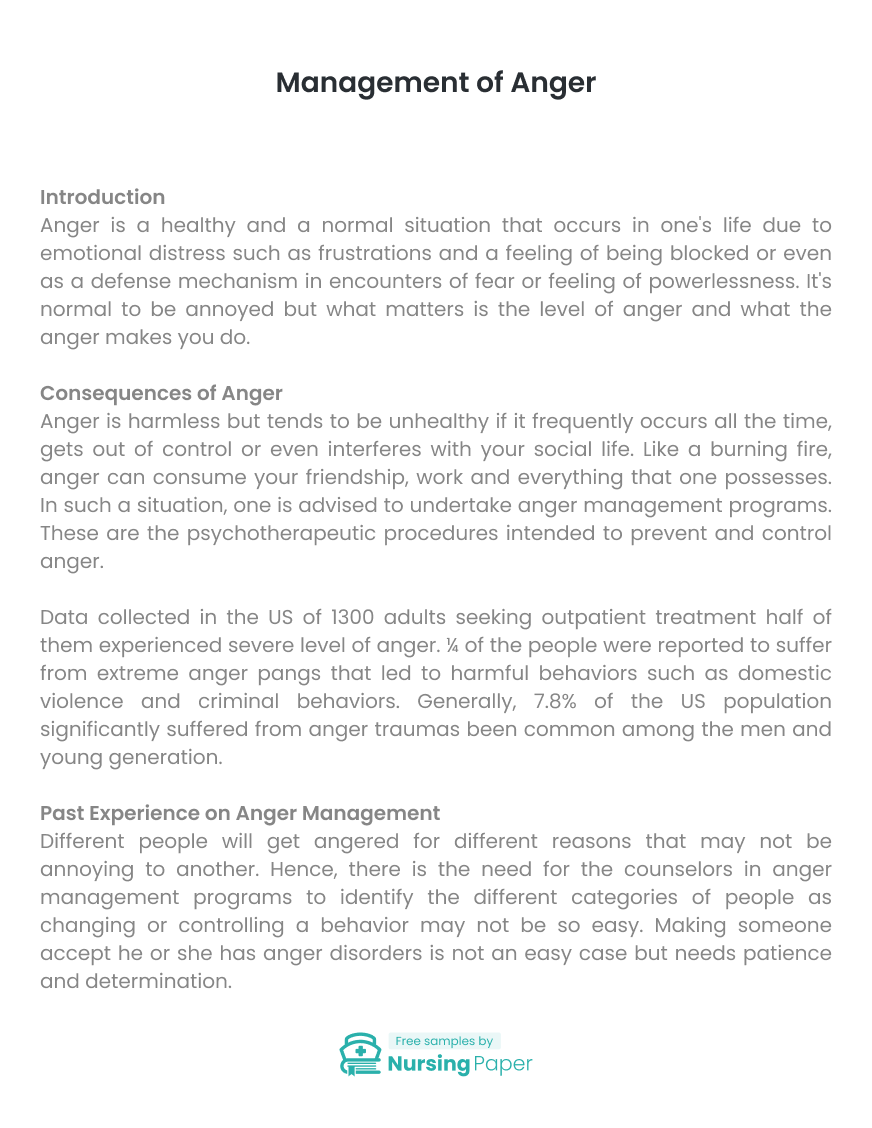
Introduction
Anger is a healthy and a normal situation that occurs in one’s life due to emotional distress such as frustrations and a feeling of being blocked or even as a defense mechanism in encounters of fear or feeling of powerlessness. It’s normal to be annoyed but what matters is the level of anger and what the anger makes you do.
Consequences of Anger
Anger is harmless but tends to be unhealthy if it frequently occurs all the time, gets out of control or even interferes with your social life. Like a burning fire, anger can consume your friendship, work and everything that one possesses. In such a situation, one is advised to undertake anger management programs. These are the psychotherapeutic procedures intended to prevent and control anger.


Data collected in the US of 1300 adults seeking outpatient treatment half of them experienced severe level of anger. ¼ of the people were reported to suffer from extreme anger pangs that led to harmful behaviors such as domestic violence and criminal behaviors. Generally, 7.8% of the US population significantly suffered from anger traumas been common among the men and young generation.
Past Experience on Anger Management
Different people will get angered for different reasons that may not be annoying to another. Hence, there is the need for the counselors in anger management programs to identify the different categories of people as changing or controlling a behavior may not be so easy. Making someone accept he or she has anger disorders is not an easy case but needs patience and determination.
Ways on Controlling Anger
In order to personally control anger, simple exercises such as taking a deep breath, meditation, positive self-talk, yoga exercises, recalling pleasant memories as well as listening to your favorite or watching a favorite movie may help one cure the extent effects caused by this malady known as anger.

Goals of Anger Management
The anger management programs are meant to control the re-occurrence of anger. These programs encourage people to never utter negative words about themselves since may distance you from people who may help you in the problem. It also insists that people remain focused on their future dreams and goals and words uttered to them should not create room for anger but should be the start of a new era. The programs are also intended to ensure the clients are able to think critically and solve problems amicably without the interference of anger regardless of the damage done. It is important for people to expect but not to demand so as in case one is denied, it does not burst out as anger. It is important to have a self-driven motive to control anger.
1. Okuda, M., Picazo, J., Olfson, M., Hasin, D., Liu, S., Bernardi, S. and Blanco, C. (2014). Prevalence and correlates of anger in the community: results from a national survey. CNS Spectrums, [online] 20(02), pp.130-139. Available at: https://www.ncbi.nlm.nih.gov/pmc/articles/PMC4384185/ [Accessed 9 Jul. 2017].
2. Anger management. (2015). En.wikipedia.org. Retrieved 26 June 2017, from https://en.wikipedia.org/wiki/Anger_management
3. Cognitive Restructuring for Anger Managment. (2015). Mental Illness Resources. Retrieved 26 June 2017, from http://www.mental-illness-resources.com/cognitive-restructuring.html



The download will start shortly.

The download will start shortly.
 Subject:
Medicine
Subject:
Medicine  Number of pages: 5
Number of pages: 5  Subject:
Nursing
Subject:
Nursing  Number of pages: 2
Number of pages: 2  Subject:
Medicine
Subject:
Medicine  Number of pages: 21
Number of pages: 21  Subject:
Health and Social Care
Subject:
Health and Social Care  Number of pages: 6
Number of pages: 6  Subject:
Health and Social Care
Subject:
Health and Social Care  Number of pages: 2
Number of pages: 2  Subject:
Health and Social Care
Subject:
Health and Social Care  Number of pages: 18
Number of pages: 18  Subject:
Health and Social Care
Subject:
Health and Social Care  Number of pages: 2
Number of pages: 2  Subject:
Health and Social Care
Subject:
Health and Social Care  Number of pages: 9
Number of pages: 9  Subject:
Health and Social Care
Subject:
Health and Social Care  Number of pages: 2
Number of pages: 2  Subject:
Medicine
Subject:
Medicine  Number of pages: 6
Number of pages: 6  Subject:
Nursing
Subject:
Nursing  Number of pages: 4
Number of pages: 4  Subject:
Health and Social Care
Subject:
Health and Social Care  Number of pages: 4
Number of pages: 4  Subject:
Health and Social Care
Subject:
Health and Social Care  Number of pages: 3
Number of pages: 3  Subject:
Medicine
Subject:
Medicine  Number of pages: 2
Number of pages: 2  Subject:
Health and Social Care
Subject:
Health and Social Care  Number of pages: 2
Number of pages: 2 
